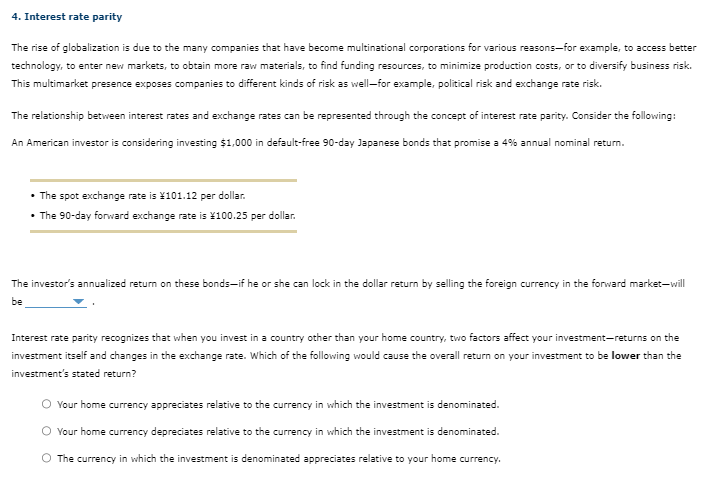4. Interest rate parity The rise of globalization is due to the many companies that have become multinational corporations for various reasons-for example, to access bett technology, to enter new markets, to obtain more raw materials, to find funding resources, to minimize production costs, or to diversify business risk This multimarket presence exposes companies to different kinds of risk as well-for example, political risk and exchange rate risk. The relationship between interest rates and exchange rates can be represented through the concept of interest rate parity. Consider the following: An American investor is considering investing $1,000 in default-free 90-day Japanese bonds that promise a 4% annual nominal return. • The spot exchange rate is ¥101.12 per dollar. • The 90-day forward exchange rate is ¥100.25 per dollar. The investor's annualized return on these bonds-if he or she can lock in the dollar return by selling the foreign currency in the forward market-will be Interest rate parity recognizes that when you invest in a country other than your home country, two factors affect your investment-returns on the investment itself and changes in the exchange rate. Which of the following would cause the overall return on your investment to be lower than the investment's stated return? O Your home currency appreciates relative to the currency in which the investment is denominated. O Your home currency depreciates relative to the currency in which the investment is denominated. The currency in which the investment is denominated appreciates relative to your home currency.
4. Interest rate parity The rise of globalization is due to the many companies that have become multinational corporations for various reasons-for example, to access bett technology, to enter new markets, to obtain more raw materials, to find funding resources, to minimize production costs, or to diversify business risk This multimarket presence exposes companies to different kinds of risk as well-for example, political risk and exchange rate risk. The relationship between interest rates and exchange rates can be represented through the concept of interest rate parity. Consider the following: An American investor is considering investing $1,000 in default-free 90-day Japanese bonds that promise a 4% annual nominal return. • The spot exchange rate is ¥101.12 per dollar. • The 90-day forward exchange rate is ¥100.25 per dollar. The investor's annualized return on these bonds-if he or she can lock in the dollar return by selling the foreign currency in the forward market-will be Interest rate parity recognizes that when you invest in a country other than your home country, two factors affect your investment-returns on the investment itself and changes in the exchange rate. Which of the following would cause the overall return on your investment to be lower than the investment's stated return? O Your home currency appreciates relative to the currency in which the investment is denominated. O Your home currency depreciates relative to the currency in which the investment is denominated. The currency in which the investment is denominated appreciates relative to your home currency.
Chapter4: Exchange Rate Determination
Section: Chapter Questions
Problem 13QA
Related questions
Question

Transcribed Image Text:4. Interest rate parity
The rise of globalization is due to the many companies that have become multinational corporations for various reasons-for example, to access better
technology, to enter new markets, to obtain more raw materials, to find funding resources, to minimize production costs, or to diversify business risk.
This multimarket presence exposes companies to different kinds of risk as well-for example, political risk and exchange rate risk.
The relationship between interest rates and exchange rates can be represented through the concept of interest rate parity. Consider the following:
An American investor is considering investing $1,000 in default-free 90-day Japanese bonds that promise a 4% annual nominal return.
• The spot exchange rate is ¥101.12 per dollar.
• The 90-day forward exchange rate is 100.25 per dollar.
The investor's annualized return on these bonds-if he or she can lock in the dollar return by selling the foreign currency in the forward market-will
be
Interest rate parity recognizes that when you invest in a country other than your home country, two factors affect your investment-returns on the
investment itself and changes in the exchange rate. Which of the following would cause the overall return on your investment to be lower than the
investment's stated return?
O Your home currency appreciates relative to the currency in which the investment is denominated.
O Your home currency depreciates relative to the currency in which the investment is denominated.
O The currency in which the investment is denominated appreciates relative to your home currency.
Expert Solution
This question has been solved!
Explore an expertly crafted, step-by-step solution for a thorough understanding of key concepts.
This is a popular solution!
Trending now
This is a popular solution!
Step by step
Solved in 2 steps

Knowledge Booster
Learn more about
Need a deep-dive on the concept behind this application? Look no further. Learn more about this topic, finance and related others by exploring similar questions and additional content below.Recommended textbooks for you



